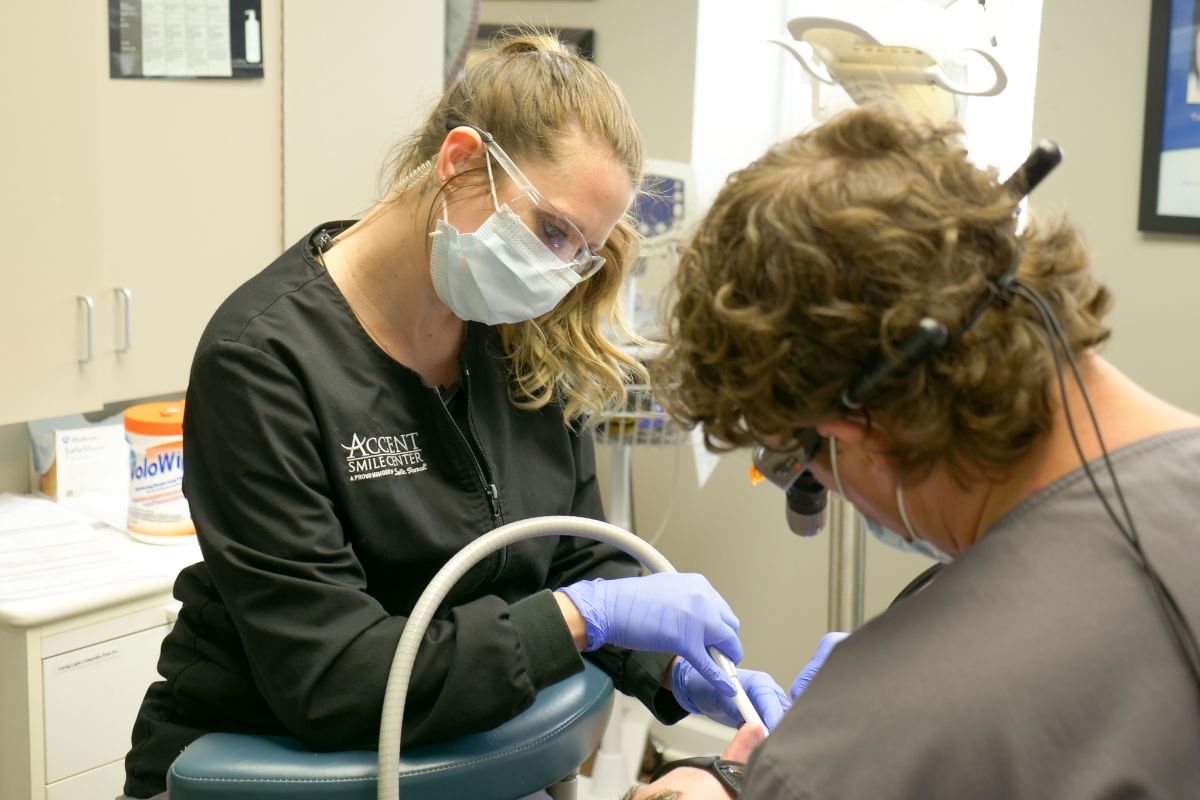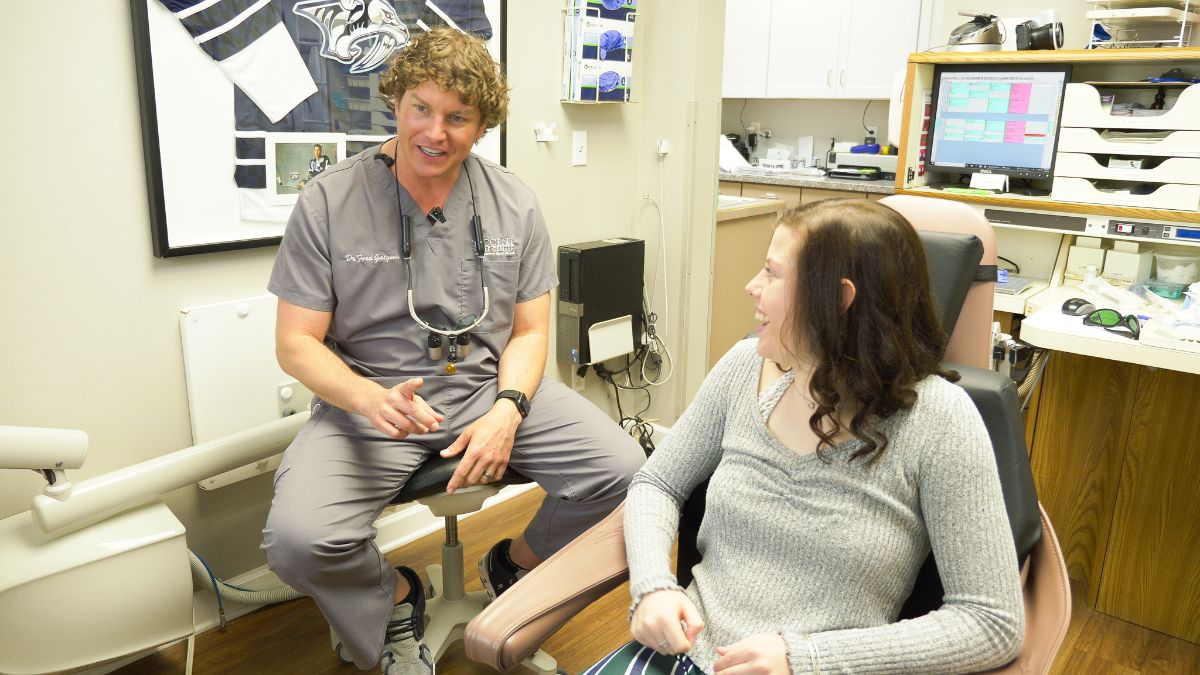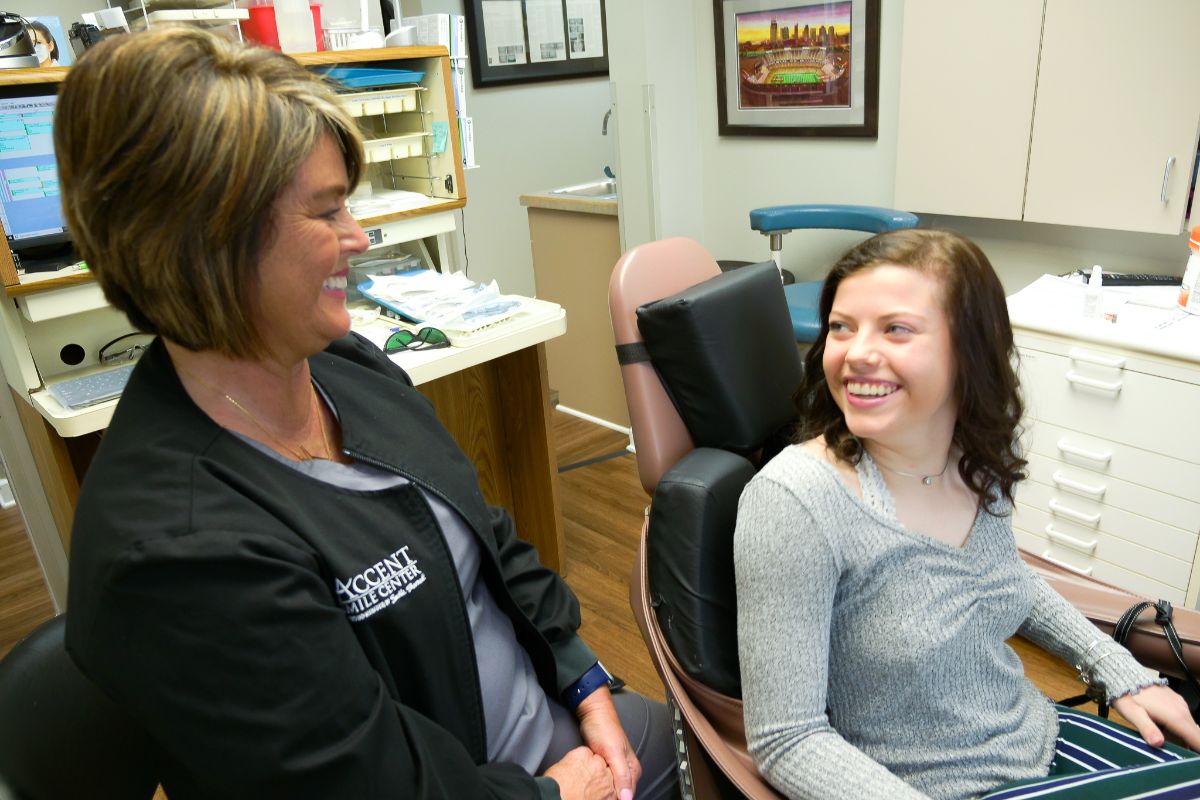Although many people still associate them with special effects more than practical applications, laser technology is an incredible innovation that can be used in many different ways. In fact, laser dentistry is able to treat a wide range of different dental conditions! The unique benefits of laser technology have led to an increasing number of dentists, and patients, choosing these laser-based procedures over conventional methods whenever possible.
Laser dentistry is precise, minimally invasive, and can be considerably less uncomfortable, depending on the procedure. Here at Accent Smile Center, we use the award-winning Waterlase system as a safe and gentle alternative to traditional dental tools. The laser energy and water spray allow us to perform many procedures with less shots or minimal drills, something that is especially appealing to anxious patients! To help you understand more about what laser dentistry has to offer, let’s take a closer look at what it is, how it works, and the many ways it can benefit you and your smile.
What is laser dentistry?
As the name implies, laser dentistry uses lasers to treat a number of different dental conditions involving teeth, gums and bone. The instruments used are able to create light energy in a very narrow and focused beam, which produces a reaction when it hits the tissue, allowing it to be shaped or removed.
Laser dentistry is used in a variety of procedures, including:
- ulcer treatments
- troughing
- cavity removal
- frenectomy
- biopsy
- crown lengthening
- gingival contouring
- periodontal treatments
- dental implants
- cosmetic laser gingivectomy
- hypersensitivity treatments
- tooth decay treatments
- gum disease treatments
- teeth whitening
Lasers can make dental treatment more efficient, affordable, and comfortable. It’s also a safe treatment option, and has been approved by the FDA. Because dental lasers have their own unique characteristics, they are used to perform specific dental procedures. There are two main types of dental lasers: hard tissue dental lasers and soft tissue dental lasers. The Waterlase laser we use allows us to perform both types of procedures safely and effectively.
Hard tissue lasers
Hard tissue lasers have a wavelength that is highly absorbable by hydroxyapatite, or the calcium phosphate salt found in bone and teeth, so they are more effective at cutting through tooth structure. These lasers are primarily used to cut into the bone and teeth with extreme precision. They can also “prep” or “shape” the teeth for composite bonding, remove small amounts of tooth structure, and repair worn-down dental fillings.
Soft tissue lasers
Soft tissue lasers have a wavelength that is highly absorbable by water and hemoglobin, which is the oxygenating protein in red blood cells. This makes them more effective for soft tissue management. These lasers have the ability to kill bacteria, activate the regrowth of tissues, and can penetrate the soft tissue while sealing blood vessels and nerve endings. This lessens or eliminates postoperative discomfort and also helps tissues to heal faster.
How are dental treatments with lasers performed?
The two main types of procedures used in laser dentistry are hard tissue (teeth) and soft tissue (gums) procedures.
Common hard tissue procedures can include:
Cavity detection
Lasers are often able to detect cavities early by discovering evidence of tooth decay.
Tooth preparation and dental fillings
With lasers, local anesthesia and traditional drills may not be needed! They’re able to kill the bacteria in a cavity, which can improve the long-term health of a tooth.
Treating tooth sensitivity
Teeth that are overly sensitive can often be treated by dental lasers that seal tubules (where the hypersensitivity presents for recession) on the tooth’s root for relief.
Common soft tissue procedures may include:
Treating “gummy” smiles
Lasers can be used to reshape the gum tissue associated with a “gummy” smile, where the gums cover too much of the tooth.
Crown lengthening
We can use dental lasers to reshape both the gum tissue and the bone for a healthier tooth structure. This helps when placing restorations on the teeth.
Frenectomy
The frenulum is the fold of skin under the front part of the tongue that is anchored to the floor of the mouth. Frenulums that are too tight or thick can cause issues, including tongue-tie, difficulty breastfeeding, and speech impediments. A laser frenectomy can release these restricted frenulums quickly and painlessly.
Other laser procedures include the treatment of TMJ issues, nerve regeneration, treating cold sores and mouth ulcers, whitening the teeth, and much more.
What are the benefits of laser dentistry?
Many dentists and patients choose laser dentistry because of the distinct benefits it offers. In addition to reducing discomfort and decreasing healing time, procedures performed using dental lasers:
- may not require sutures
- may not require anesthesia
- minimize bleeding because the lasers aid in clotting the exposed blood vessels inhibiting blood loss
- minimize bacterial infections since the lasers sterilize and kill bacteria the area being worked on
- minimize damage to the surrounding soft tissue
- have a faster healing time because the soft tissues of the mouth are able to regenerate more quickly
There are also a number of advantages in using the Waterlase system to treat dental conditions. Cutting with this laser does not cause the heat or vibration a dental drill would, meaning most dental procedures can be performed with NO discomfort. It also avoids many of the common problems associated with a high speed drill, including cracks in the teeth from vibration and a weakening of the teeth from the rapid turning of the drill burrs.
With the Waterlase, Dr. Gatgens is able to remove decay with precision, allowing you to keep a healthy tooth structure and enjoy healthier teeth for longer. It also maximizes the bonding of tooth-colored fillings, allowing them to last longer. And because the Waterlase can effectively perform numerous soft tissue procedures with little or no bleeding, procedures that previously required a specialist can now be performed during your regularly scheduled dental appointment with Dr. Gatgens!
Accent Smile Center offers nothing but the best in laser dentistry
You don’t want to trust your smile to just anyone. Fortunately, we have an expert on hand to provide the world-class skills and service you deserve! Dr. Gatgens has completed a fellowship with the World Class Laser Institute, which requires 50 hours of continuing education in laser dentistry, a written and verbal test, and a presentation of two cases in order to display full clinical competency. His knowledge and experience with lasers allows him to provide patients with the best outcomes possible in all areas of dentistry!
Laser dentistry is a convenient solution to many common dental problems, from cosmetic to complex. To find out more about what laser dentistry has to offer you, get in touch with our talented team to schedule a consultation at our Dickson office.


